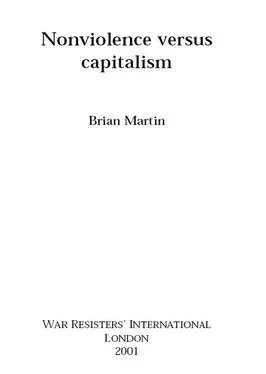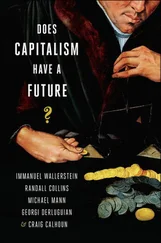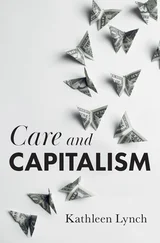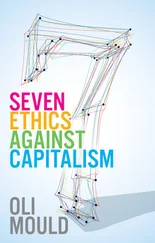Many people, especially in the United States, believe that government and corporations are antagonistic, with opposite goals. When governments set up regulations to control product quality or pollution, some corporate leaders complain loudly about government interference. But beyond the superficial frictions, at a deeper level the state operates to provide the conditions for capitalism. The state has its own interests, to be sure, especially in maintaining state authority and a monopoly on what it considers legitimate violence, but it depends on capitalist enterprises for its own survival, notably through taxation. In capitalist societies, states and market economies depend on and mutually reinforce each other. [12] . Robert L. Heilbroner, The Nature and Logic of Capitalism (New York: Norton, 1985), p. 105, says “remove the state and the regime of capital would not last a day.” See also Michael Moran and Maurice Wright (eds.), The Market and the State: Studies in Interdependence (London: Macmillan, 1991); Charles Tilly, Coercion, Capital, and European States, AD990-1992 (Cambridge, MA: Blackwell, 1992). Note that there are areas of obvious friction between state and corporate interests. For example, businesses want secure encryption whereas government spy agencies want only encryption that they can break. The clash is most obvious in total economic mobilisation for war, during which the state overrides the market. See Lionel Robbins, The Economic Problem in Peace and War: Some Reflections on Objectives and Mechanisms (London: Macmillan, 1950).
In recent decades there has been an enormous expansion of private policing. In the US, for example, there are now more security guards, private detectives and others privately paid to carry out policing duties than there are government-funded police. In the military arena, there are now private mercenary companies ready to intervene if the price is right. However, these developments do not change the basic point that capitalism is built on relationships between people, production and distribution ultimately protected by armed force.
As capitalism is increasingly globalised, international policing and military intervention become more important to protect and expand markets and market relationships. For example, economic blockades, backed by armed force, can be imposed on countries such as Cuba. Usually, though, the lure of the market for elites in weaker countries is more effective than military coercion. [13] . Another factor is US policy elites’ support for elite-dominated representative government in Third World countries as a better method of domination in a globalising world, using methods that appear more consensual than authoritarian: William I. Robinson, Promoting Polyarchy: Globalization, US Intervention, and Hegemony (Cambridge: Cambridge University Press, 1996).
Investment has done more to promote capitalism in Vietnam than decades of anticommunist warfare.
Although capitalism is backed up by violence, in day-to-day operation no coercion is required. Most people believe that the world works according to capitalist dynamics, and behave accordingly. Quite a few of them believe, in addition, that this is the way things should work, and exert pressure to bring nonconformists into line.
Here are a few common beliefs in capitalist societies, with comments in brackets.
Capitalism is superior to alternatives. (Many people assume that success, in other words dominance, means superiority or virtue. Logically, this doesn’t follow.)
Capitalism is inevitable. (In the face of everyday reality, many people cannot easily conceive of an alternative that is fundamentally different.)
It is fair that people receive what they earn. (The system of jobs operates as a method of allocating the economic product to individuals and groups. This system is arbitrary and built on the exercise of power. There is nothing inherently fair about it.)
The market is the most efficient method of matching supply and demand. (In practice, many “markets” are artificial constructions, as in the case of copyrighted software. The market is not used for things people hold dearest, such as allocating affection in a family.)
Selfishness is innate and justified; it makes the profit system operate. (Humans have the potential for both selfishness and altruism. [14] . Alfie Kohn, The Brighter Side of Human Nature: Altruism and Empathy in Everyday Life (New York: BasicBooks, 1990).
Social systems can foster either.)
People who are poor have only themselves to blame. (Blaming the poor ignores the exercise of power in creating poverty and denies the social obligation to help those in need.)
Greater production and consumption lead to greater happiness. (Actually, happiness is not closely correlated with objective measures such as income. [15] . Michael Argyle, The Psychology of Happiness (London: Methuen, 1987).
Happiness is more related to how people subjectively compare themselves with others, which suggests that inequality fostered by markets reduces happiness. [16] . Relevant here is Paul L. Wachtel, The Poverty of Affluence: A Psychological Portrait of the American Way of Life (Philadelphia: New Society Publishers, 1989).
)
Politics is something that politicians do; ordinary citizens are not involved except through voting and lobbying. (If politics is taken to be the exercise of power, then capitalist economic arrangements are intensely political. That workers do not vote to choose their bosses does not mean there is no politics at the workplace, but rather that workplace politics is authoritarian.)
* * *
Beliefs do not arise out of nothing: they are an adaptation to the situations in which people find themselves, sometimes challenging these situations. There are three main ways in which beliefs supportive of capitalism develop and are maintained: daily life, schooling and mass media.
First, most people adjust their beliefs to be compatible with their daily life. This is a process of reducing “cognitive dissonance,” namely the difference between reality and thought. If daily life is filled with buying and selling, this makes market exchange seem more natural. If daily life involves working as an employee along with many others, this makes selling one’s labour power seem more natural. If daily life involves noticing that some people are very rich and some very poor, this makes great economic inequality seem more natural.
But just because something seems natural does not necessarily make it positive or desirable. There is, though, a general tendency for people to believe that the world is just. When someone is poor, this is a potential challenge to the assumption that the world is just. One way to cope is to believe that the poor person is to blame.
Of course, for wealthy and privileged people, it is tempting to believe that they deserve their wealth and privilege, and that others deserve their misfortune. Beliefs in the virtues of capitalism are commonly stronger among its greatest beneficiaries.
Part of day-to-day experience is interacting with other people. If others share certain beliefs, it can be hard to express contrary views, and easier to keep quiet or adapt one’s beliefs to standard ones.
A second source of beliefs is schooling. Children learn conventional views about society, learn that they are supposed to defer to authority and learn that they need to earn a living. Just as important as what is learned in the classroom is what is learned from the structure of the schooling experience: pupils are expected to follow the instructions of their teachers, a process that is good training for being an obedient employee.
A third source of beliefs about capitalism is the mass media, especially the commercial media, which “sell” capitalism incessantly through advertisements, through pictures of the “good life” in Hollywood movies and television shows, and in plot lines in which good guys always win. Due to global media coverage, basketball star Michael Jordan became a cult figure even in countries where basketball is not a big sport. Jordan is a symbol of competitive success. He embodies the assumption that someone can become rich and famous by being talented and that being rich and famous is a good thing, worth identifying with and emulating. Jordan thus is living testimony to the capitalist marketplace, even setting aside the products that he endorses. Sport generally is something that is sold through the mass media, especially television, and used to sell other products, such as Nike running shoes and McDonald’s. [17] . Walter LaFeber, Michael Jordan and the New Global Capitalism (New York: Norton, 1999).
Читать дальше

![Brian Jacques - Martin the Warrior [Redwall 6]](/books/128385/brian-jacques-martin-the-warrior-redwall-6-thumb.webp)










